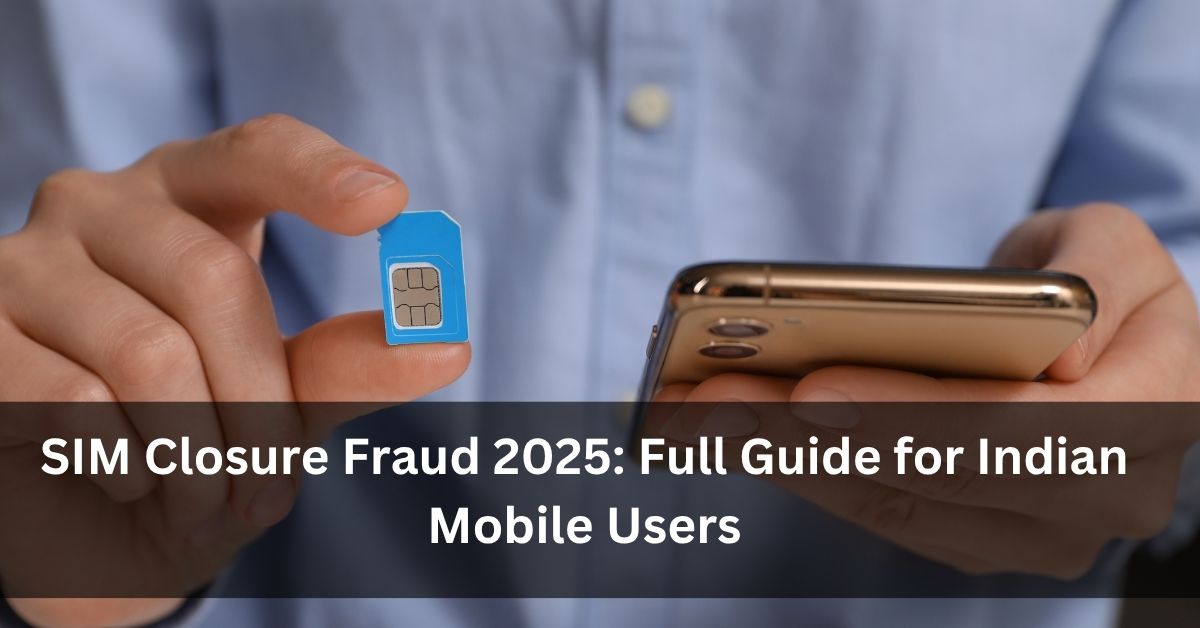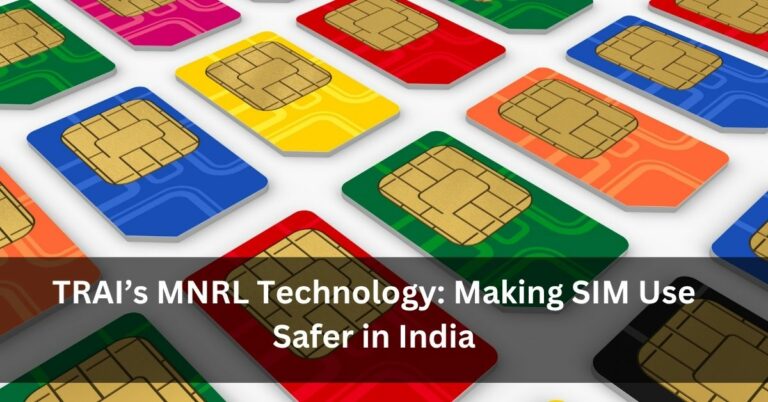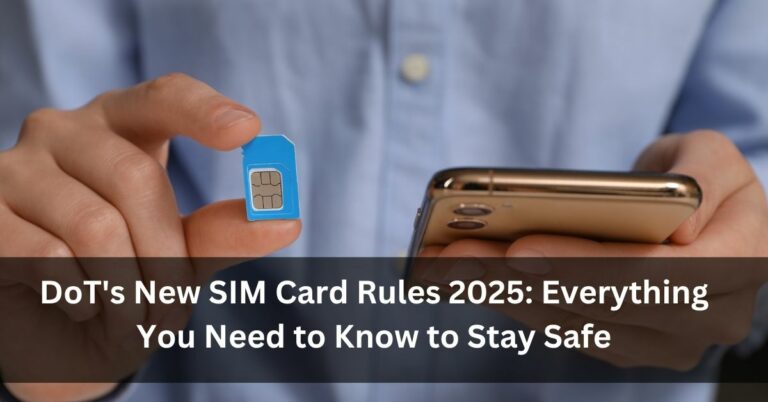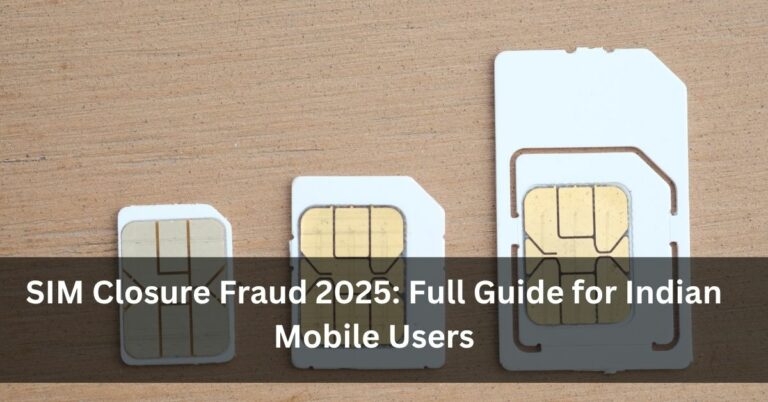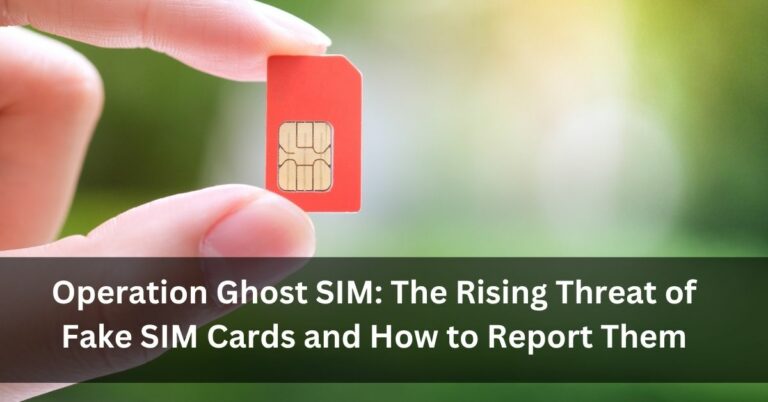SIM Closure Fraud 2025: Full Guide for Indian Mobile Users
Mobile numbers are now connected to everything—from your bank account to UPI apps and social media. Losing access to your SIM card is not just about losing phone service—it can lead to money loss and stolen identity.
In 2025, many Indians are getting calls or messages saying “Your SIM will be deactivated today” or “Update your KYC to avoid number suspension.” These are usually fake. They are part of a scam called SIM closure fraud.
At Portal Chakshu, we explain this in simple words so that anyone using a mobile phone can understand the risk and take steps to stay safe.
What Is SIM Closure Fraud?
SIM closure fraud is a trick where scammers try to control your mobile number. Once they get access, they can receive your OTPs, log in to your bank apps, and take control of your online accounts.
They do this by sending fake messages or calling you while pretending to be from your mobile company. They might say your SIM is being blocked and that you must verify your identity by clicking a link or sharing an OTP. But once you share this information, they can misuse it.
What Are the Common Signs?
Here’s what to watch out for:
- You get a message saying your SIM will be closed soon.
- A caller says they are from Airtel, Jio, or Vi and need to verify your KYC.
- You’re asked to click a link to complete a form or verify details.
- Someone asks for your Aadhaar number or OTP during a call.
- Your phone suddenly loses network and shows “No Service.”
If any of these things happen, pause and think. These could be signs of fraud.
Real Cases Reported in 2025
SIM-related fraud is not rare anymore. Many people have lost money and data.
- Case 1: ₹1,500 Crore Scam: Scammers operated from Dubai using over 350 Indian SIM cards. They sent fake messages and made calls pretending to be from law agencies like CBI and police. People were scared into sharing personal info or sending money. This scam was recently uncovered by enforcement agencies.
- Case 2: Mumbai Businessman Loses ₹7.5 Crore: A steel trading company in Mumbai faced a major loss after fraudsters got access to their company’s SIM-linked phone. Once the scammers had control, they used OTPs to move large sums of money out of the business account.
Portal Chakshu has reported and followed up on such incidents, showing how serious this problem is.
How SIM Closure Fraud Happens?
Let’s look at the steps scammers usually follow:
Step 1: Fake Alert
You receive a message saying your SIM is at risk. The message often looks real and may include your mobile operator’s name.
Step 2: Pressure Tactic
The scammer tries to rush you. They’ll say your number will be shut down within hours unless you act quickly.
Step 3: Link or Call
They send a link and ask you to update KYC details or make you talk to someone posing as customer care.
Step 4: You Share Info
You may enter your name, Aadhaar number, or even your OTP. This gives them the access they need.
Step 5: Duplicate SIM
They visit a mobile store and use your details to get a new SIM card. Your SIM stops working, and theirs becomes active.
Step 6: Account Takeover
They receive your bank OTPs, log in to your accounts, and transfer money.
What the Government and Telecom Companies Are Doing?
Authorities have started taking steps to fight back. These are some of the measures introduced in 2025:
- New 1600-Series Numbers: Only genuine calls and messages from banks or telecom operators will come from numbers starting with 1600. If a number doesn’t look like this, think twice.
- Mobile Number Revocation List (MNRL): The Reserve Bank of India has told banks to check if a number is still active before sending sensitive details like OTPs.
- Stricter SIM Rules: Telecom companies must now follow e-KYC for all new SIMs. Vendors who do not follow rules are being removed.
- 7-Day Waiting Period for Porting: If someone replaces your SIM, they now must wait seven days before the number can be moved to a new provider. This helps stop quick fraud.
For more updates on such steps, keep checking Portal Chakshu.
How Can You Protect Yourself?
Simple steps can save you from falling into such traps.
- Do Not Share OTPs: Never share your OTP, PIN, or Aadhaar number with anyone on call or over SMS—even if they say they’re from your mobile company.
- Use Only Official Apps or Sites: Don’t click on links sent by SMS or WhatsApp. Use the official app or website of your mobile operator to check your KYC or SIM status.
- Set SIM Lock or PIN: Ask your mobile provider to set a lock or PIN for any SIM replacement or account change.
- Report Right Away: If your SIM suddenly stops working or you suspect something wrong, contact your service provider and call the cybercrime helpline at 1930.
- Turn on 2-Step Login: Use authentication apps (like Google Authenticator) instead of SMS-based OTPs for your bank or email accounts.
- Spread the Word: Tell your family and friends, especially elders, about these tricks so they can stay safe too.
We regularly post tips like these at Portal Chakshu.
Final Words
SIM closure fraud is not just about losing mobile service. It can lead to money loss and personal information being stolen. These scams are growing across India, and anyone can be a target.
But if you stay alert, don’t share sensitive information, and report suspicious messages or calls, you can avoid being fooled.
Stay connected with Portal Chakshu for more updates and simple guides that help protect your digital life. We keep it simple, we keep it useful.

